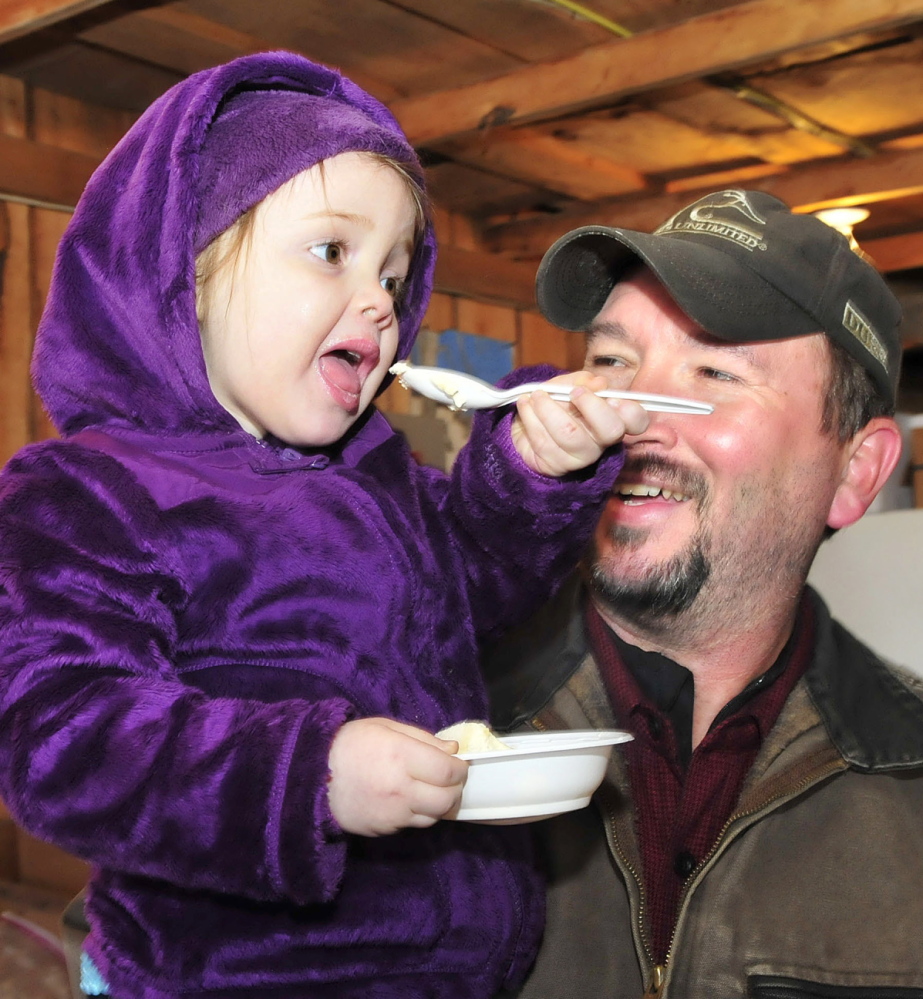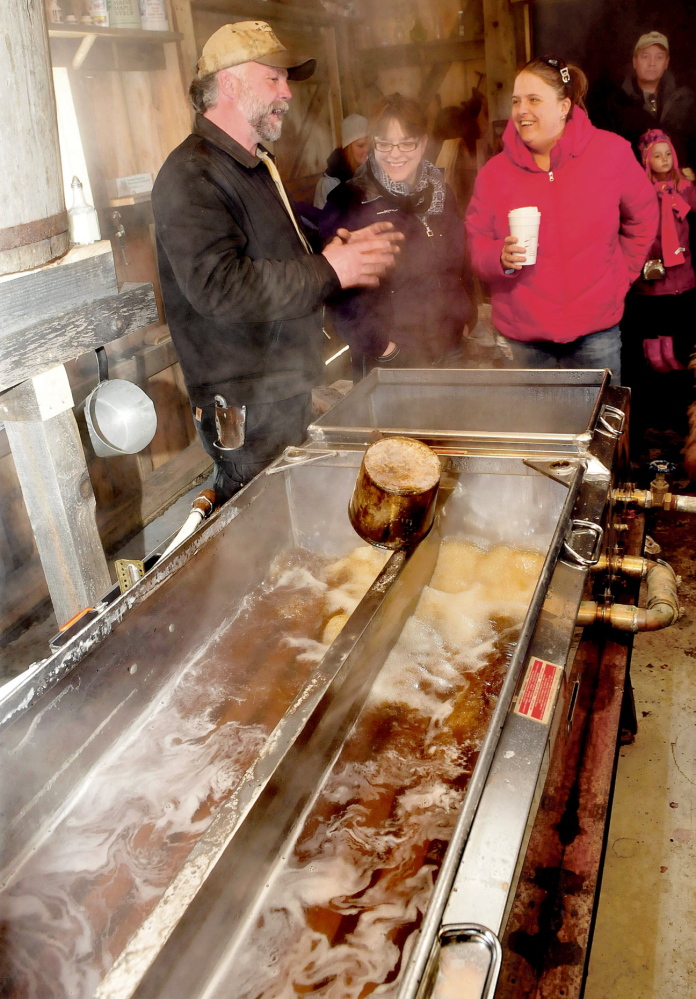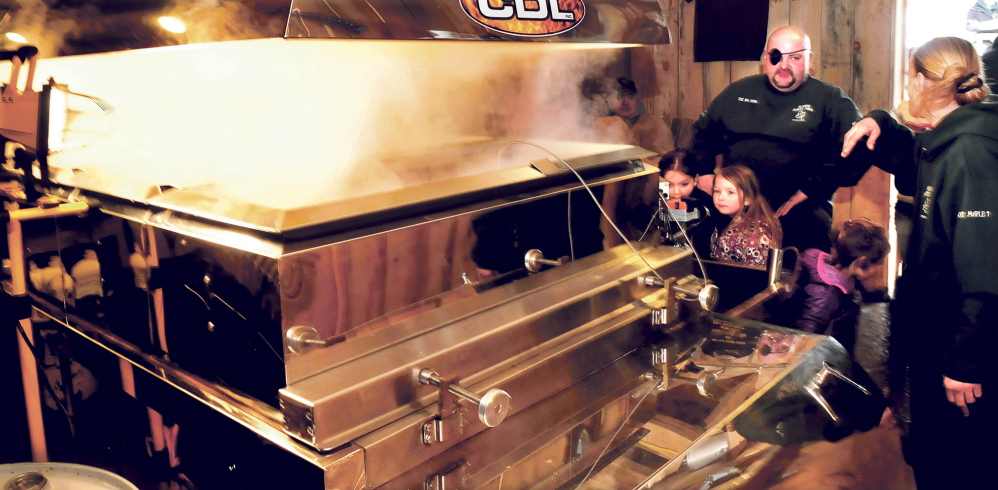While the sap wasn’t flowing yet at Hall Farm in East Dixfield, Meg and Wayne Smith said they were still enjoying Maine Maple Sunday.
The annual event celebrating Maine’s maple syrup industry was hampered this year by cold weather leaving sap too frozen to collect for a traditional syrup-making demonstration.
Wayne, however, said there was still plenty of fun to be had at area sugar houses. Meg added that they already produced a tiny amount of syrup as a hobby, and this Sunday was more about sampling syrup and socializing. Their granddaughter, Haleigh Hutchins, eagerly ate a sample of ice cream topped with maple syrup, while being held by Wayne.
“It’s been a long winter. It’s nice to get out,” he said.
Maine Maple Sunday, held the fourth Sunday in March, celebrates Maine’s syrup-making tradition and its role in the state’s heritage. Maine has the third-largest maple syrup industry in the country, according to a University of Maine study, and each year, the industry directly contributes about $27.7 million in revenue, 567 full- and part-time jobs and $17.3 million in wages to Maine’s economy.
This year the event fell way too early in the shifting syrup season for many producers. Syrup production is ideal when temperatures are freezing at night and above freezing during the day.
Farmer Rodney Hall said that while the sap wasn’t flowing from their 7,200 trees in time for the event, he wasn’t worried about the season. He said as long as temperatures allow for a full season, it won’t affect production starting after the fourth Sunday.
“We’ve started early the last few years,” he said. “We’re just having a later season.”
Further along Route 2, there was just enough sap to boil at Sunrise Maple Farm. Producer Joe Gould told a group of children just tall enough to peer into the basin the syrup was pouring into, that the syrup was made from sap that flowed inside maple trees.
“You guys need to eat right?” he asked the group.
“Yeah,” heads nodded.
“Well, sap is how trees eat,” he said.
Standing beside the steaming evaporator, Gould said they had just enough sap flowing in their 16,000 tree taps to run the demonstration. Echoing Hall, Gould said he was not worried that starting later would hurt the season, as long as it doesn’t suddenly warm up and end the season.
“With Mother Nature, you can never really tell,” he said.
In Fairfield, new producers Steve and Isabelle Lemieux had plenty of visitors for their first time partaking in the event, despite having little sap for demonstrating their equipment. The curious residents had turned out to view the traditional equipment the couple were using for sugaring. A small crowd watched while Steve monitored an evaporator with sap flowing from four refurbished wooden barrels instead of modern stainless steel holding tanks.
Even the sugar house was made from wood logged and milled on the property using horses as muscle and traditional cutting and finishing methods. Outside of the sugar house, families waited for tours of the sugar bush on the Lemieux’s horse-drawn wagon — the same horses used to haul the sap in after it is collected by bucket.
The couple decided to use all traditional equipment, Steve said, as a way of getting back to their roots.
“We’re both from Quebec, and this is how we both made it when we were younger. We wanted a chance to show people really old-school equipment,” he said.
Kaitlin Schroeder — 861-9252kschroeder@centralmaine.com
Send questions/comments to the editors.





Success. Please wait for the page to reload. If the page does not reload within 5 seconds, please refresh the page.
Enter your email and password to access comments.
Hi, to comment on stories you must . This profile is in addition to your subscription and website login.
Already have a commenting profile? .
Invalid username/password.
Please check your email to confirm and complete your registration.
Only subscribers are eligible to post comments. Please subscribe or login first for digital access. Here’s why.
Use the form below to reset your password. When you've submitted your account email, we will send an email with a reset code.